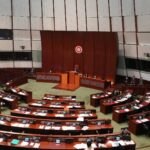US society is anxiously waiting for the voting results in the last key states. But the metrics which decided the outcome of previous elections may not work this time. Both campaigns described this election as a duel between two different values and paths. And people buy it. While the election is about to come to an end, it seems that nothing could have a decisive voice and amend US woes fundamentally.
If we look at the intense sentiments on US mainstream media and the internet, they do not look like debating who will be the next president. Although reporting on these sentiments is a political show, which usually took place in the US in the past, its repetition makes people worry whether society could return to normal after the show.
This time, no one would believe that the division in this election is just a show. The division is so real and profound that the only thing uncertain this time is how deeply it will hurt the US.
Every society has internal divergences and contradictions. The design of the US system indulges and even encourages the fermentation of contradictions. Mechanisms help maintain the balance between interests and power. For a long time, this performed relatively well, but new challenges are changing the conditions of US mechanisms, and changing relations between the effectiveness of US mechanisms and the difficulties US society faces.
The fundamental change is that the US has been consuming its accumulated advantages against the backdrop of globalization. Its pattern of interests has been fixated, and the overall competitiveness of the country has been sliding. The welfare it has made for the people cannot match people’s demands and expectations. The mechanism that distributes interests solidifies and further erodes social ability of promoting unity.
In the internet era, identity politics is rising. People can easily feel that their rights are deprived because they are from a certain social class. Maintaining social unity has become an increasingly arduous and sensitive task. Obviously, the US needs political reforms more than many other countries to enhance its ability to promote unity.
But in the past four years, the Trump administration, incited by the US election system, has pushed the country into a risky path where it enhances division to boost the existing pattern of political interests. There are so many social woes in US society, be it between different races and classes, between new immigrants and old ones, and between different regions, let alone partisan. But now the objective of society has been cast on Trump’s reelection. This objective has to a great extent squeezed the room of US society to pursue maximum common interests.
Since the outbreak of the COVID-19 epidemic in the US, the Trump administration has dealt with it with an eye on the election, while people’s lives and safety were pushed aside. If the US hadn’t made the mistake of casting all eyes on the election, the country, which ranks No.1 in terms of public health resources, wouldn’t have allowed the epidemic to rage to such an extent that more than 200,000 people have died from it.
Although it is obvious that the US has embarked on many wrong paths, the balance of power in the election shows that the serious social division has jeopardized Americans’ judgment. Humans are insignificant, and choosing a camp is the easiest choice for them to maintain their own interests. The deeper social division is, the more people judge from their own position. That people distinguish between friends and foes not based on right or wrong will become a common political practice.
The US system has its own history and culture, but it has to amend itself in accordance with the times. It is time US elites say goodbye to political arrogance and engage in collective reflection. They should have a correct view of the systematic problems in US politics and reach the consensus that the US needs to keep reforming like other countries. Only on this basis can the US truly be determined and driven to change itself.



